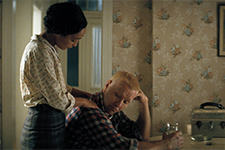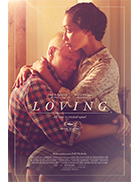Loving
|  Like the quiet, media-shy couple on whom the film is based, Jeff Nichols’s Loving is admirably low key, shunning easy sensationalism and melodramatic politicization in favor of something more delicate and genuine and intimate. Nichols has built a nearly decade-long career on rendering sensational stories about family feuds (2007’s Shotgun Stories), apocalyptic visions (2011’s Take Shelter), and supernatural powers and government menace (2016’s Midnight Special) in a way that feels uniquely thoughtful and emotionally stirring and deeply personal. He is a cinematic alchemist who takes obvious genre material and reworks it into something special, which makes him one of the very best American directors working today. If Loving is his weakest film to date, it is still very good by just about any standard. The film’s narrative begins in 1958, when there were still numerous states that still enforced their antiquated anti-miscegenation laws, including the state of Virginia where Richard Loving (Joel Edgerton), a white man, and Mildred Jeter (Ruth Negga), a black woman, who are romantically involved live. When Mildred becomes pregnant, she and Richard steal away to Washington, D.C., to be married, and then return to Virginia to resume their generally placid lives (he works in construction, and he buys a plot of land with dreams of building them a house). That is not to be, however, as word gets out about their marriage and cohabitation, which brings the police into their bedroom late one night with flashlights and handcuffs. They are both arrested and thrown in jail, and when they are able to meet with a lawyer (Bill Camp), he advises them to take a plea deal, get a commuted sentence, and then promise not to return to the state together for 25 years—a hard sell for them both of them since their respective families live there. When they return to the state for Mildred to have her baby (Richard’s mother is a midwife, and they both wanted her to deliver), they are arrested again, which garners enough attention that the American Civil Liberties Union is willing to send a lawyer, Bernie Cohen (Nick Kroll), to work with them. Cohen aspires to take the case to the Supreme Court; for him, the battle is not the individual one being fought by the Lovings, but rather the big picture in which anti-miscegenation laws can be struck down across the nation. Richard and Mildred are both skeptical, Richard especially; he just wants to live his life with his wife and child and not be burdened with the weight of being the national face of interracial love. One of the film’s more intriguing subtexts is the impossible-to-resolve tension between the requirements of social justice on this scale—the legal fight to ensure that Americans can love and be with whom they want regardless of skin color—and the strain that puts on those whose case becomes the vehicle for such change. Richard and Mildred, who are beautifully played by Edgerton and Negga with just the right touches of poignant rural mundanity and emotional depth that is rarely spoken, just want to be left alone together, but that requires them to face down, literally and symbolically, a large swath of the nation that would rather see them in jail than living happily ever after. The fact that they did not even attend the eventual Supreme Court hearing that determined their fate is indicative of their priorities. Nichols, again working with cinematographer Adam Stone, who has shot every one of his feature films to date (they are perhaps the best director-cinematographer pair to emerge from the American indie scene since David Gordon Green and Tim Orr), ensures that Loving is a visually gorgeous film, conveying in the beauty of its imagery the importance of its central relationship. Composer David Wingo (who, probably not coincidentally, started his career working with Green and has already scored three of Nichols’s films) produces a subdued score that doesn’t go for big swells or rollicking punctuation; rather, much like the subdued couple at the center of the film, it reminds us of the simple beauties of life. And that, in a nutshell, is what is wonderful about the film as a whole. It doesn’t go for big emotional moments or clichéd grandiosity of the type we are used to in movies about major social issues, which does keep the film from fulfilling certain expected pleasures—the kind of big, feel-good moments of fist-pumping catharsis that Hollywood is so good at wringing from the historical register. Instead, Nichols focuses on the simple notion of love itself and how the best kinds of love don’t always stand out from the crowd, but endure it. Copyright © 2016 James Kendrick Thoughts? E-mail James Kendrick All images copyright © Focus Features |
Overall Rating: 


 (3.5)
(3.5)


